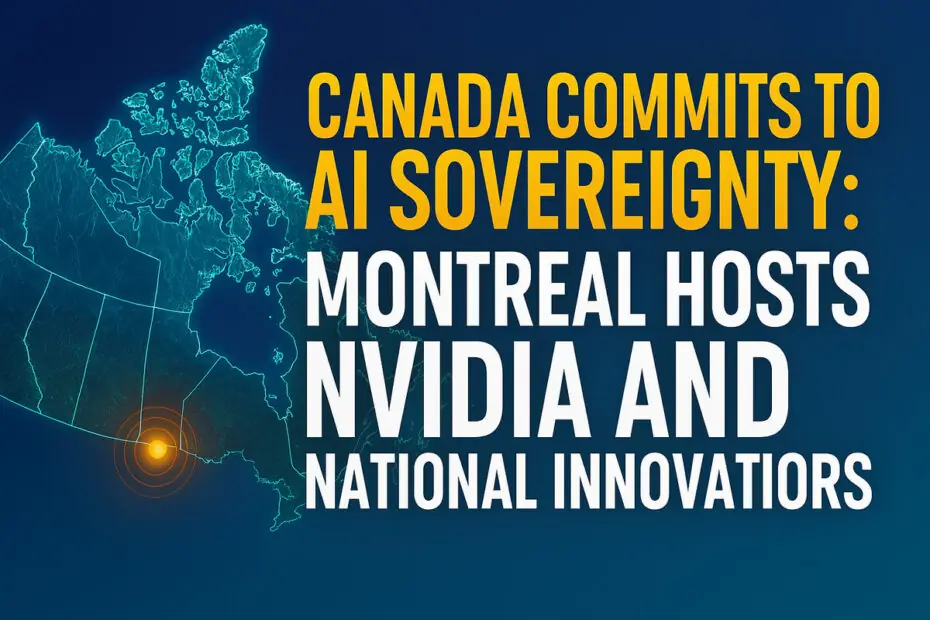Canada’s position at the forefront of the global artificial intelligence landscape was a central theme at this week’s All In Canada AI Ecosystem event. The gathering served as a showcase of the nation’s coordinated push to shape the future of this transformative technology.
The event featured a keynote address from Kari Briski, NVIDIA’s Vice President of Generative AI Software, who was joined by Canada’s Minister of Artificial Intelligence and Digital Innovation, Evan Solomon, and Aidan Gomez, the cofounder and CEO of Cohere. The discussion was moderated by Amber Mac of SiriusXM.
Setting the tone for the day, Minister Solomon addressed the assembled founders, researchers, investors, and students, stating, “You’re all here to deliver the next big thing.” He framed the AI revolution not merely as a technological shift, but as “the birth of the age of the entrepreneur.”
The timing of the event coincides with significant national advancements. TELUS, a leading Canadian communications company and NVIDIA Cloud Partner, has announced the launch of Canada’s first fully sovereign AI factory in Rimouski, Quebec. This facility is powered by NVIDIA’s accelerated computing platform. In parallel, financial services firm RBC Capital Markets is leveraging NVIDIA software to develop sophisticated AI agents for capital markets.
This focus on domestic capability is a core tenet of the government’s strategy. “For our government, for our country, ‘All In’ means building digital sovereignty-the most pressing policy and democratic issue of our time,” Minister Solomon asserted.
This sentiment was echoed by Kari Briski in a panel discussion following the address. “Every nation should develop its own AI, not just outsource it,” Briski argued. She emphasized that for AI to be truly effective, it must reflect local values, understand cultural context, and align with national norms. “It needs to speak and write in the nuanced patterns of your natural language. Digital intelligence isn’t something you can simply outsource.”

The event marks a pivotal moment, uniting public and private sector leaders to focus on the infrastructure, innovation, and policies required to secure Canada’s AI future. Minister Solomon distilled this ambition into a clear objective: “Canada must own the tools and the rules that matter at this critical moment. We need our digital insurance policy, and that’s what we’re building.”
Building Sovereign Infrastructure
The new TELUS facility, built in collaboration with HPE and powered by NVIDIA technology, provides end-to-end AI capabilities, from training complex models to running them in production, while ensuring all data remains within Canadian borders. The facility is already operational, serving clients like OpenText, and is powered by 99% renewable energy.
The initiative has garnered significant industry support. Accenture will develop and deploy industry-specific solutions on the TELUS platform to accelerate AI adoption for its Canadian clients. Similarly, League, a leading healthcare consumer experience provider, will run its comprehensive suite of AI-powered healthcare solutions using this sovereign infrastructure.
A Global Movement with Canadian Roots
This event is part of a broader, global wave as nations race to harness AI for economic and research advancement. Over the past year, NVIDIA founder and CEO Jensen Huang has met with heads of state in France, Germany, India, Japan, and the U.K. to discuss national AI strategies.
Minister Solomon acknowledged the competitive landscape, noting, “Leadership is not a birthright. It has to be earned again and again, and the competition is fierce.”
Canada’s claim to leadership is built on a strong foundation. During a previous visit, Mr. Huang himself highlighted Canada’s pioneering role, describing it as the “epicenter of innovation in modern AI,” a legacy built by researchers like Geoffrey Hinton and Yoshua Bengio, the latter of whom also spoke at the conference.
Meanwhile, the practical application of this technology continues to advance. RBC Capital Markets is utilizing NVIDIA’s NeMo and NIM platforms to build enterprise-grade AI agents. These intelligent systems are designed to be tailored to local needs, transforming how the institution conducts research and delivers insights to its clients globally.
Maybe you would like other interesting articles?

